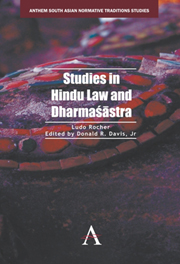Book contents
- Frontmatter
- Contents
- Foreword by Richard W. Lariviere
- Preface
- Abbreviations
- Note on the Edition
- Introduction
- PART ONE THE NATURE OF HINDU LAW
- Hindu Conceptions of Law
- The Historical Foundations of Ancient Indian Law
- Hindu Law and Religion: Where to Draw the Line
- Law Books in an Oral Culture: The Indian Dharmaśūstras
- Schools of Hindu Law
- Changing Patterns of Diversification in Hindu Law
- PART TWO GENERAL TOPICS OF HINDU LAW
- PART THREE HINDU LEGAL PROCEDURE
- PART FOUR TECHNICAL STUDIES OF HINDU LAW
- PART FIVE ANGLO-HINDU AND CUSTOMARY LAW
- Bibliography
- Index
The Historical Foundations of Ancient Indian Law
from PART ONE - THE NATURE OF HINDU LAW
Published online by Cambridge University Press: 05 February 2013
- Frontmatter
- Contents
- Foreword by Richard W. Lariviere
- Preface
- Abbreviations
- Note on the Edition
- Introduction
- PART ONE THE NATURE OF HINDU LAW
- Hindu Conceptions of Law
- The Historical Foundations of Ancient Indian Law
- Hindu Law and Religion: Where to Draw the Line
- Law Books in an Oral Culture: The Indian Dharmaśūstras
- Schools of Hindu Law
- Changing Patterns of Diversification in Hindu Law
- PART TWO GENERAL TOPICS OF HINDU LAW
- PART THREE HINDU LEGAL PROCEDURE
- PART FOUR TECHNICAL STUDIES OF HINDU LAW
- PART FIVE ANGLO-HINDU AND CUSTOMARY LAW
- Bibliography
- Index
Summary
It cannot be our intention in the following pages to sketch an image of ancient Indian law as it was really practiced (before law courts, etc.), and then to compare this practiced law with the details of the written law. It is too early and our sources of information are too scarce to take such a chance; in fact, I doubt whether one will ever succeed in finding a satisfactory solution this problem with regard to ancient India. What I want to offer the reader instead are deliberations of a general sort that relate to the question and, insofar as possible, to ascertain the extent to which written sources of law were meant by their authors to play a role in determining legal practice.
Before this, however, some remarks about two factors affecting an investigation of this kind should be taken into consideration: first, the value of the notion of “history” in India; and, second, the Indian conception of the relationship of law and history. It is generally accepted that in ancient India the idea of “history” in the meaning of “chronology” or “accurate dating,” practically does not exist. In whatever area of ancient India one works, one always has to contend with Macdonell's conclusion that “History is the one weak spot in Indian literature. It is, in fact, non-existent. The total lack of the historical sense is so characteristic, that the whole course of Sanskrit literature is darkened by the shadow of this defect, suffering as it does from an entire absence of exact chronology” (Macdonell 1900: 10).
- Type
- Chapter
- Information
- Studies in Hindu Law and Dharmasastra , pp. 59 - 82Publisher: Anthem PressPrint publication year: 2012



